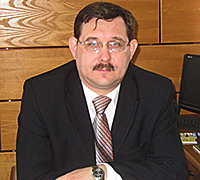«I started playing chess at the end of the 70's» said Vladimir Anikin, Assistant to the Head of Kursk» Those were the golden years of chess. There were dozens of divisions and clubs all occupying a worthy place in the mass media. Chess, along with ballet and space achievements, became a symbol of the era. It taught us how to play and how to live. Kursk's regional team took part in the semi-finals of the USSR Championships and in the prize-winning tournament of the «Komsomolskaya Pravda» newspaper, where our best teams played in the finals against some of the country's most powerful grandmasters.
A few years ago, I discovered remote chess. It has remained popular for many years and, when the Internet came, reached a new level. Chess teaches strong interactions. Many laugh, arguing that only namby-pambies play chess, but this is a stereotype. In my experience, the majority of chess players are athletes because mental effort requires vigour. It improves both strategic and tactical thinking.
FIDE President, Kirsan Ilyumzhinov once proposed a programme of teaching chess in schools. The International Chess Federation even allocated money for it annually, but in today's Russia everything has decayed. However, where chess was included in the school curriculum, (at the initiative of Ilyumzhinov), the level of players has grown significantly, and the schools have started to pay more attention to exact sciences. It has changed children's thinking, but we have missed that opportunity.
For example, even if we tried to introduce chess in elementary schools in Kursk, we wouldn't find 60 qualified teachers. But this does not mean that we should not strive to this goal. Chess is alive and will be with humankind for millennia».
Ivan Kruglov
 If there were no chess, it definitely would have to be invented. This game is part of world culture and has spawned many great players. It moved into the digital sphere along with humankind, but without changing.
If there were no chess, it definitely would have to be invented. This game is part of world culture and has spawned many great players. It moved into the digital sphere along with humankind, but without changing. 






















